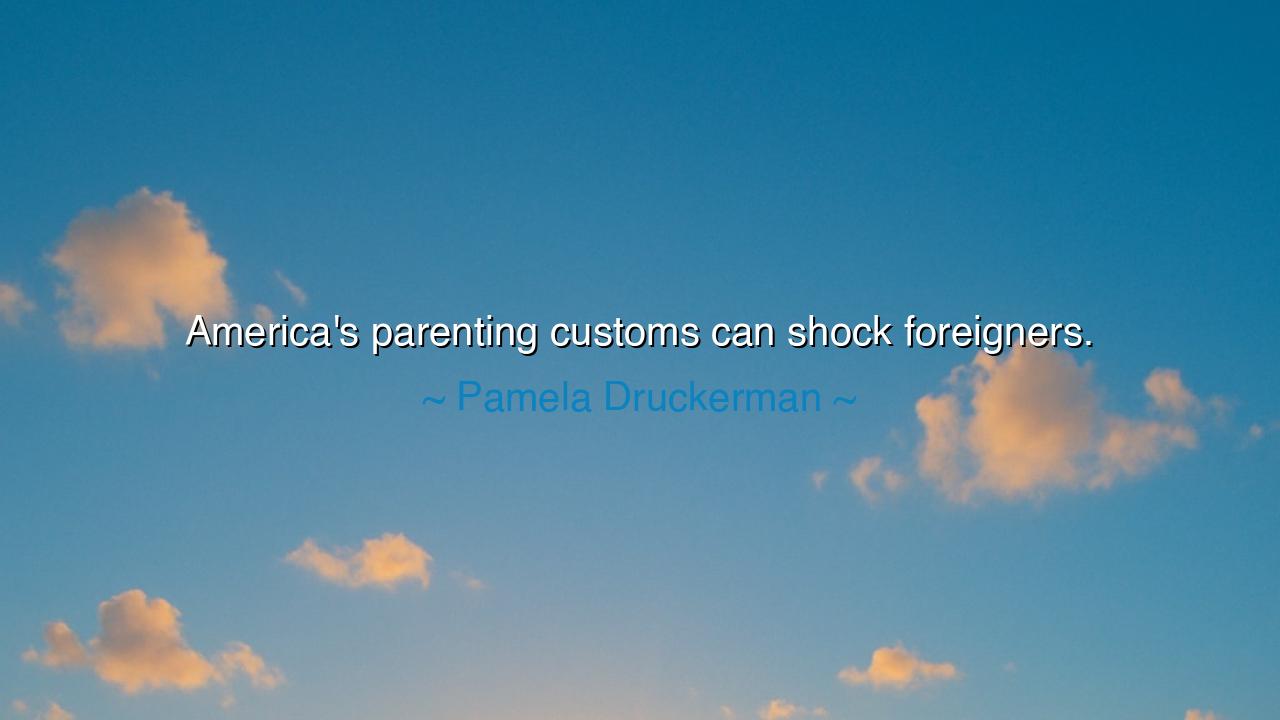
America's parenting customs can shock foreigners.






Pamela Druckerman, a keen-eyed chronicler of culture, once observed with striking simplicity: “America’s parenting customs can shock foreigners.” These words, though brief, carry immense weight, for they speak to the deep truth that the raising of children is never a neutral task, but is woven from the fabric of culture, tradition, and values. What seems natural and unquestionable to one people may appear strange, even alarming, to another. In this, we learn that parenting is not merely biological but profoundly social, shaped by the invisible hands of custom and expectation.
The origin of Druckerman’s insight lies in her own journey as an American mother raising children in France, an experience she described in her celebrated work Bringing Up Bébé. She saw firsthand the differences between American and French parenting: where American parents might hover anxiously, French parents often gave their children more independence; where Americans filled childhood with endless structured activities, French families valued quiet meals and patience. To the outsider, each method could seem shocking, yet to those within the culture, it was simply the way things were done.
History, too, is rich with such contrasts. In ancient Sparta, for example, children were taken from their mothers at a young age to be raised in a military system of discipline and endurance. To outsiders, this seemed harsh, even cruel; yet to the Spartans, it was the highest form of love—to forge strong warriors who could defend the state. Contrast this with Athens, where boys were raised in households and tutored in philosophy and the arts, a way of parenting that would have seemed indulgent to Spartans but cultivated one of the greatest intellectual civilizations in history. Thus, Druckerman’s words echo a timeless truth: what shocks one culture is the strength of another.
Her statement also speaks to the dangers of assuming superiority. Many parents, wherever they live, believe their way is the only correct way, yet Druckerman’s observation reminds us to step back in humility. If foreigners are shocked by American customs, it may not be because they are wrong, but because they are different. And if Americans are shocked by the customs of others, the same applies. Parenting becomes a mirror that reveals the values of a society: independence or dependence, discipline or freedom, structure or spontaneity.
At the same time, Druckerman’s words point to an opportunity. When cultures meet and are surprised by one another’s methods, there is a chance for growth. A parent who sees another way of raising children might reflect more deeply on their own. The French, for instance, could learn from Americans the value of creativity and encouragement; Americans could learn from the French the art of patience and boundaries. In this exchange lies the possibility of crafting not just good parents, but wise ones, who take the best from many traditions.
The lesson for us is clear: do not cling blindly to the customs of your land, nor reject the ways of others in arrogance. Instead, observe, reflect, and learn. Recognize that parenting customs are not eternal laws but living practices, and that wisdom often comes from seeing with fresh eyes what we once took for granted. If foreigners are shocked by your ways, ask why. And if you are shocked by theirs, ask also why. In those questions lies growth.
Therefore, let Pamela Druckerman’s words be remembered: “America’s parenting customs can shock foreigners.” Let them remind us that the art of raising children is a tapestry of many colors, and that no single culture has woven the whole of truth. Walk humbly, observe deeply, and be willing to learn from others. For in the end, children are not merely the heirs of one nation—they are heirs of humanity. And the wiser we are in learning from one another, the greater their inheritance will be.






AAdministratorAdministrator
Welcome, honored guests. Please leave a comment, we will respond soon